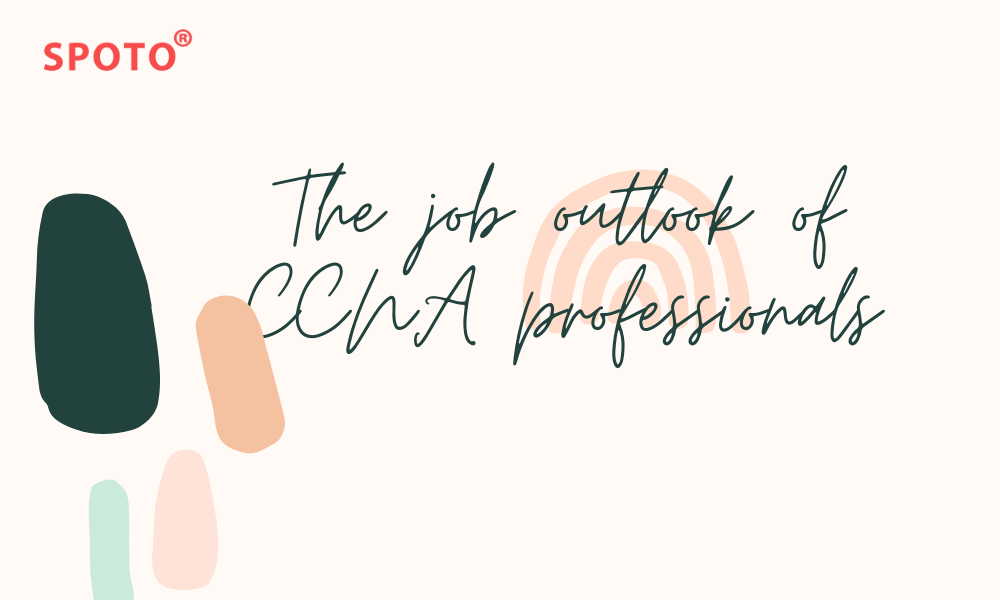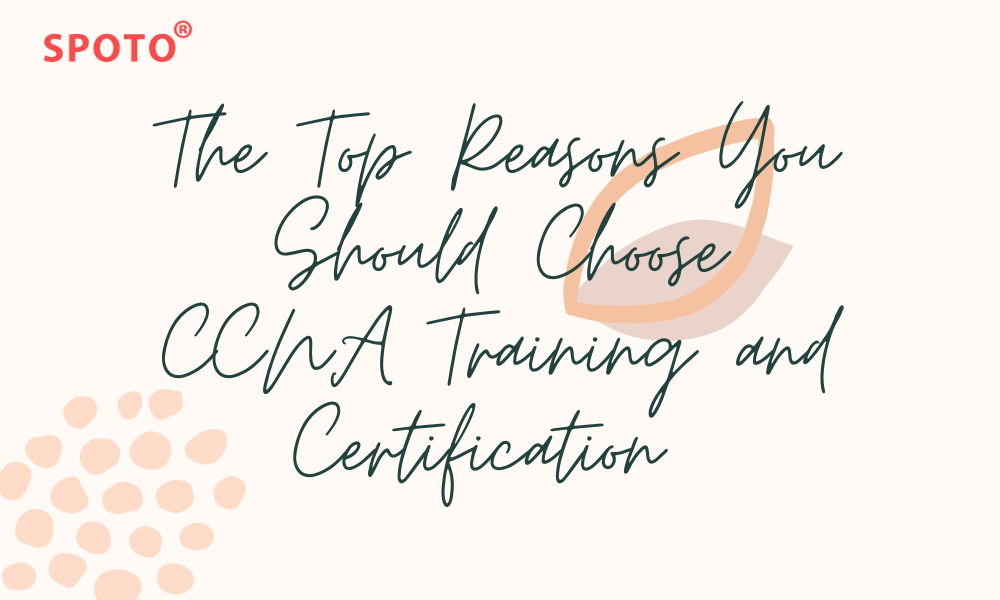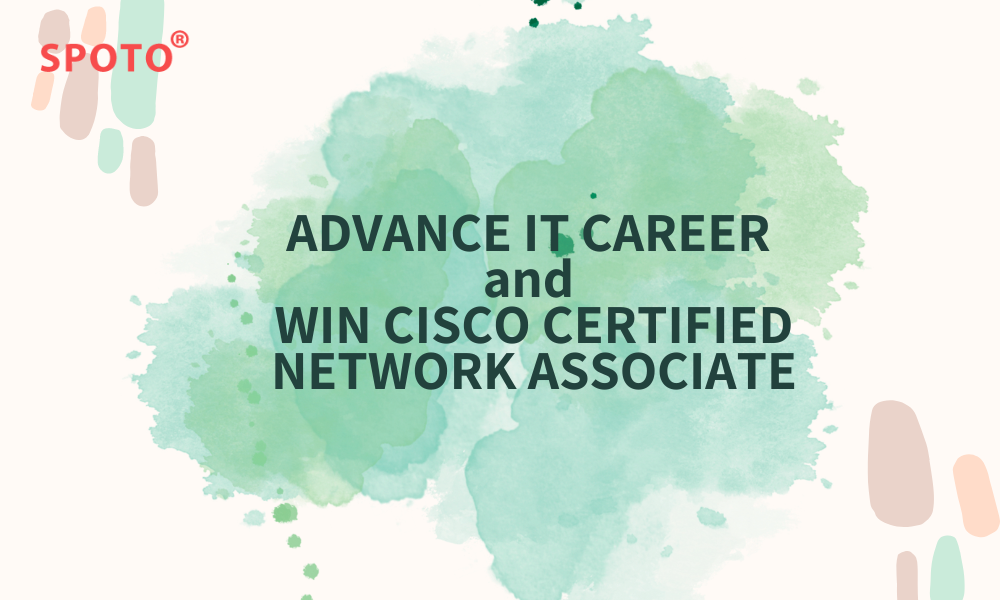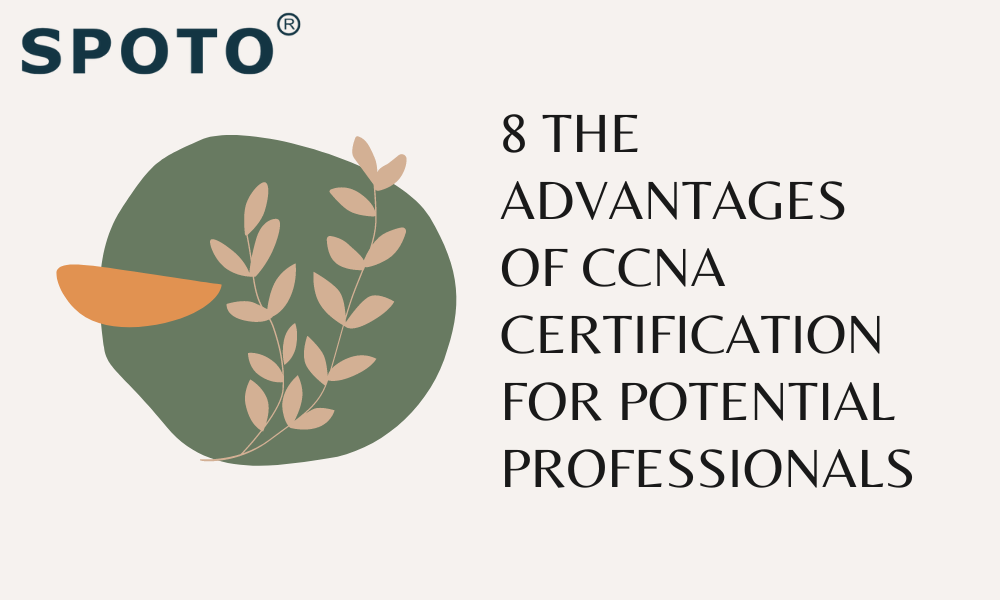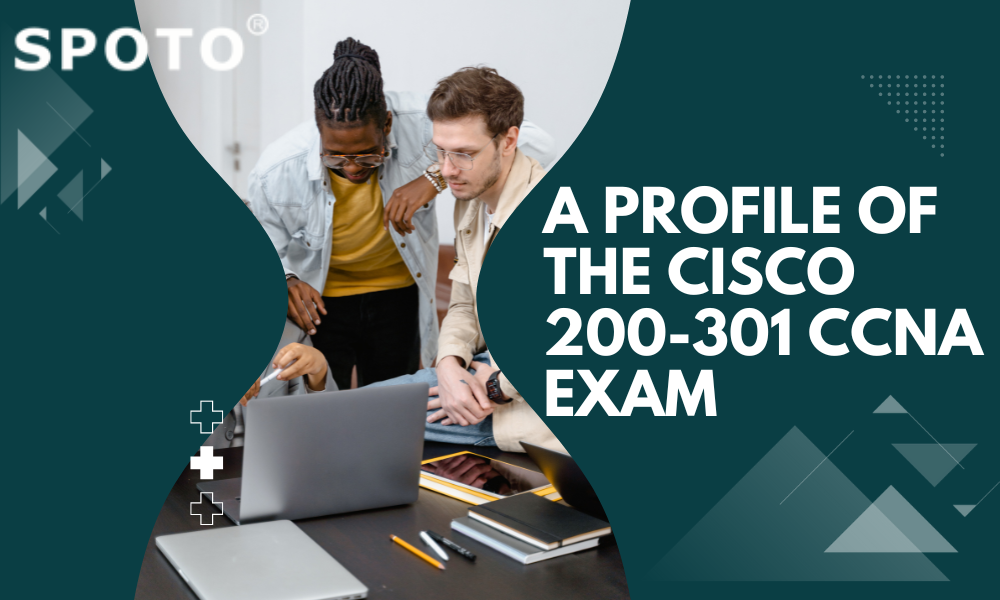TRUSTED BY THE SMARTEST TEAMS IN THE WORLD FOR CERTIFIED CANDIDATES
SPOTO Blogs
Useful learning materials to become certified IT personnel
-
- 872
- SPOTO
- 2023-02-17 15:50
-
- 1083
- SPOTO
- 2023-02-14 14:03
-
- 693
- SPOTO
- 2023-02-14 13:17
-
- 983
- SPOTO
- 2023-02-13 12:55
-
- 663
- SPOTO
- 2023-02-10 13:44
-
- 866
- SPOTO
- 2023-02-09 14:18
-
- 851
- SPOTO
- 2023-02-08 17:16
-
- 869
- SPOTO
- 2023-02-07 15:20
-
- 731
- SPOTO
- 2023-01-24 16:41
TRUSTED BY THE SMARTEST TEAMS IN THE WORLD FOR CERTIFIED CANDIDATES
SPOTO Blogs
Useful learning materials to become certified IT personnel
-
- 872
- SPOTO
- 2023-02-17 15:50
What are the prerequisites for the CCNA exam? This is the entry-level Cisco certification. CCNA, i.e. Certified Cisco Network Associate certification is required for both IT professionals as well as network administrators. Cisco is the most prominent vendor of IT network equipment. Do you want to become a CCNA-certified professional? Find out more about CCNA. What's CCNA Certification? Cisco offers an entry-level course CCNA. This course is designed for network engineers who want to advance their careers and deal with technical issues network devices may present. What areas are most CCNA-focused? There is high demand for Cisco-certified professionals. The CCNA certification has expanded its reach to include the following areas. Security Routing and Switching Service providers Data center's Video Voice Collaboration Wireless An individual can improve his network engineering skills by becoming CCNA certified. The CCNA certification allows professionals to expand their knowledge and grow by joining other domains that are relevant to their industry needs and interests. For most IT professionals, the CCNA certification is required. Although there are many versions of this exam, the most popular is the CCNA Switching and Routing. The Associate level exam is possible so there are no prerequisites. There are two restrictions: a person younger than 13 years old cannot take the exam, and anyone between 13-17 must have parental consent. Cisco doesn't require you to have taken any exams to be eligible for the CCNA. Despite not having any prerequisites, the exam can be challenging. The test is 90 minutes long and includes both multiple-choice questions as well as performance-based questions. The exam requires that the candidate proves their problem-solving abilities and knowledge in a short time. This exam can be stressful so it is a good idea to have some practical experience in networking before you take the exam. These are the top ways to prepare for the CCNA. Study material You can find many study materials to help you get started. There are many options, including video courses, study guides, labs, and other materials. For those who wish to pursue this path, there is a list Cisco approved materials. However, you can also find many other options from other vendors. No matter whether you choose to pursue paid or free options, you must ensure that you cover every aspect of the exam. Your learning style will determine the method you choose. It is recommended that you take a self-paced course regardless of your level of knowledge. They will assess your knowledge level at the beginning of the course. This ensures that you don't get overwhelmed by unfamiliar concepts or become bored with concepts you already know. It is possible to overlook some ideas while watching videos, so you will likely need additional materials. Many consider the official Cisco Certification Guide to be the best available study guide. You can't replace the hands-on experience gained through a variety of lab courses or study guides. Modern simulation tools such as GNS3 allow you to practice most of the performance-based content that you will see on the exam. Practice Tests Practice tests will give you a good idea of the actual exam. Although no practice exam can cover the same questions as the actual exam, tutoring packages that include a CCNA practice test will provide you with questions from past exams. These questions were provided by Cisco and will give you an idea of the structure of the exam. These questions should be completed in the time allowed. This will give you a better chance of passing the actual exam. Additional preparation You will likely do some self-study as well as seek out outside help, no matter how you prepare for the exam. If you are looking for a personal touch, you might consider external training such as SPOTO and its live courses. These include live instruction for several hours, and SPOTO allow you to schedule appointments with an instructor. Understanding your learning style and pace is the key, which you will hopefully gain from past classwork. You can combine all the things you like before you take your exam. Register to receive training There are two options. You can either learn by yourself or you can take the self-study program. You can also go to a recognized training institution to receive CCNA Training in SPOTO. The mentors will provide all the tips and tricks you need to pass the exam. -
- 1083
- SPOTO
- 2023-02-14 14:03
The job outlook of CCNA professionals A look at the job prospects for those with certifications is one of the best ways you can evaluate it. This can be a bit confusing if the certification you are looking at has undergone a major overhaul. This can alter candidate expectations or even make it questionable if you should apply for the certification. This article will discuss the Cisco CCNA certification, which is a network administrator certificate. It will also cover the CCNA overview, benefits, job opportunities, salaries, and job titles for CCNA-certified professionals. The article will also highlight the top US cities based on the potential salary for CCNA professionals. This article will help you if you are unsure about obtaining the CCNA certification and how it could impact your career, financial standing, and professional future. Overview and benefits of CCNA certification In February 2020, the changes that were made to Cisco Certified Network Associate (or CCNA) took effect. CCNA used to be a collection of various associate-level certifications. Employers would typically require CCNA professionals to hold more than one certification. These certifications were: CCNA Collaboration CCNA Cloud CCNA Industrial CCNA Wireless CCNA Security CCNA Data Center CCNA Service Provider CCNA Routing & Switching All of these individual certifications have been abandoned, and now there is only one CCNA exam. This exam is meant to make it easier for all CCNA professionals. It's easy enough, pardon the pun. But how do you determine if you are eligible to take the exam? You have no prerequisites, which is great! This is the one thing that has remained constant from previous exam versions. This should be noted by candidates who have: Cisco Solutions: More than 1+ Year of Experience Basic knowledge about IP addressing Network fundamentals are a solid foundation CCNA certification confers the same benefits as before, despite structural changes to the certification exam. These benefits include: Career boost Recognize Salary/pay raise This is the first step towards other Cisco certifications Respect your coworkers more Global Acceptance This outline is less detailed than other career paths (such as Microsoft). You can validate your competence with the most up-to-date technology There are many job opportunities for CCNA-certified professionals The biggest question a cert holder has to ask is about the job opportunities available to them. The United States Bureau of Labor Statistics predicts that the employment outlook for IT networking professionals with CCNA certification will grow at 8% per year until 2026. This is due to the increased use of networking technologies and cloud-based services in the corporate world. In addition, networking infrastructures will be stronger until 2026 according to the business world. The pay for CCNA-certified professionals is good, and you have career growth. PayScale estimates that CCNA-certified professionals can earn a median salary of $78,701, which is almost 30% more than the average salary in the United States. Common job titles and salaries of CCNA-certified professionals Next, let's talk about the logical questions: What jobs are available to CCNA-certified professionals? And what are their salaries? Let's talk turkey. Below are the job titles and salaries for CCNA-certified professionals: Sr. Network Engineer: $101,000 Network Engineer: $75,000 Network Administrator: $63,000 Information Technology Manager: $86,000 Information Technology Director: $106,000 Systems Engineer: $75,000 Software Engineer: $89,000 Network Administrator, IT: $60,000 $64,000 for System Administrator Network Senior System Engineer: $100,000 Network Security Engineer: $87,000 Cyber Security Analyst: $78,000 Senior Systems Engineer: $98,000 Systems Engineer, IT: $78,000 Information Technology Specialist: $63,000 Senior Systems Administrator: $85,000 Network Analyst: $62,000 Security Engineer: $88,000 Information Security Analyst: $69,000 Senior Network Administrator, IT: $82,000 This list isn't exclusive, believe it or not! You can see that CCNA certification opens up more opportunities than the one for network administrators. Instead, CCNA certification can serve as a launchpad to help you take the skills and knowledge that the CCNA cert validates into the vast reaches of the IT career industry. This certification is also applicable to all IT-related sub-disciplines. The top ten most lucrative cities in the United States for CCNA-certified professionals Okay, now you understand that this certification is useful and will help your IT career. Next, you need to know where CCNA-certified professionals in the United States can increase their salaries. Here is a list of the top cities where CCNA-certified professionals can find work: San Jose: $94,000 Washington D.C. $76,000 New York City: $75,000 Chicago: $72,000 Houston: $72,000 Dallas: $71,000 Atlanta: $68,000 Conclusion The CCNA certification is a good option for those who want to obtain an associate-level certificate to either become a network administrator or just validate their Cisco and networking skills. Although there have been some changes to the certification exam in 2020, they are mostly in terms of their structure. The result is simpler and more efficient for candidates. This cert has a unique feature: it can be used to jump-start other IT areas. It does not make you a network administrator, but it can validate your IT skills and knowledge. -
- 693
- SPOTO
- 2023-02-14 13:17
Do you want to improve your CV and find a better job? You are now eligible to receive Cisco CCNA Certification. Are you ready to begin your journey towards Cisco certification? You might be wondering what the Cisco Certifications learning process is. Every month, a large number of people begin the certification process. All of them will have to answer the same questions and make the same choices. The most common questions are: Where do I start with Cisco certifications? Which Cisco certifications are available? What are the steps to get started? How long will it take for Cisco certification? What is the cost of certification? These are just a few questions that you'll find answers to. Cisco certification has many benefits. It will allow you to not only get a higher-paid job or promotion, but also to be part of the worldwide community of Cisco engineers. Cisco certification is a great benefit if the company where you work has the Cisco infrastructure. This is often the case for many companies today. As a CCNA in many cases, you will be able work remotely. This could also mean that you can have a flexible working schedule. Any of the Cisco certificates will enhance your IT career. Cisco certification can make you stand out to potential employers and recruiters, or even make you more popular at your current job. Cisco certifications are a great option if you're looking to advance your career or improve your existing work skills. There are not many options for Cisco Certifications for different sub-domains in networking. These will be divided into different ranges. Cisco Certified Network Associate (CCNA) Cisco Certified Entry Network Technician (CCENT) Cisco Certified Design Associate (CCDA) CCNA Routing & Switching is by far the most popular option. Cisco CCENT is an alternative, but it's still a popular choice. Cisco CCDA is a great alternative to CCNA. Cisco certification allows candidates to get the best out of their education, improve their skills and enable their IT organizations meet the highest business criteria during their professional transition. Cisco offers a learning community that allows candidates to share their knowledge, take part in group discussions, access study materials, ask questions, and receive training. Cisco offers many preparation options that can be used to match different learning styles and schedules. CCNA Routing & Switching certification shows that you have the skills and knowledge to create, maintain, and troubleshoot medium-sized network infrastructures. CCNA Cloud and CCNA Collaboration, CCNA Data Center and CCNA Data Center are all available. Depending on the CCNA specialty, a Prerequisite is required for most of CCNA Routing & Switching exams. How to prepare for the CCNA Exam (standard method) Self-study can include practice exams and textbooks. Or, you can take on-site classes like Cisco Networking Academy or enroll in online courses such as SPOTO. These are all options available to Cisco authorized learning partners. You must pass the 200-301 CCNA exam to become CCNA certified. Cisco certification exams are available testing centers, or online proctored exams that can be done from home or work. Online registration is possible up to six weeks ahead. Your current score will determine your pass grade. The exam lasts 90 minutes and contains 70 questions. Passing score is 810. The Cisco CCNA Certification is valid three years. The validity of Cisco certifications will be extended by passing the CCNA Specialist exam, or completing a higher level certification. How to prepare for the CCNA Exam. (CertWizard method) Although obtaining a Cisco Certificate can boost your IT career, it requires planning, learning, and training. With today's hectic schedules, most people don't have the time to do all that. Earning a Cisco certification is a great way to improve your career and/or change careers. SPOTO can help you obtain Cisco CCNA certification the fastest and easiest way. Cisco CCNA Application Requirement: Please provide the following information to apply for Cisco certification: First name: Last Name Telephone number (with country code): Name and exam code for the Cisco certification: Cisco CCNA 200–301 Two identification documents (E.g. Two identification documents (E.g. Driving license and passport): Please email all this information to SPOTO.com, and you will receive all the certification process details, payment instructions and installment information from us. We will begin the Cisco certification process under your name once we have received payment. You should pass your Cisco exam in 5-7 business days. After we pass a CCNA exam, you will be able to check the certification results at the Cisco Certification Web site (https://cisco.pearsoncred.com). At the end of your Cisco certification process, you will receive: Your Cisco certification login details, Cisco certificate, Cisco certification transcript, Cisco CCNA digital badge from Acclaim (https://www.youracclaim.com/organizations/cisco/badges). The average CCNA salary for a female CCNA is $55,200 to $90,650. While the average male salary ranges between $53,500 and $89,800, The CCNA certification is a foundational certificate that can be used to help you get a job in networking. It's also one of the most sought-after certifications in the industry. -
- 983
- SPOTO
- 2023-02-13 12:55
The Top Reasons You Should Choose CCNA Training and Certification Benefits of CCNA Training The main benefit of Certification and CCNA Training is that they will improve the learning curve. Even though you've been involved in networking for a long time, it is important to continue to develop your skills to meet the challenges. You don't have to face the day-to-day challenges that may lead you to lose your most beloved job in your networking career. Why CCNA Training Is Important Cisco certification prepares employees and employers for the IT industry. While nothing can replace involvement, certifications are important to ensure that aspirants stay abreast of the latest technological developments in the IT industry. Many candidates have noticed positive changes in their careers after completing the CCNA training. You can get CCNA certification, which is a perfect qualification that you can use to enhance your resume when applying for a job in the Cisco networking industry. One of the most important benefits of CCNA Certification is that your recognition will increase. 93% of employers believe that Cisco-certified employees can increase their company's value and are more knowledgeable than non-Cisco-certified candidates. They are encouraged to achieve significant talent and real advantages through this certification process. This certification is significant for a long period. You get to enjoy the benefits of your CCNA certification for a very long time. The advantages of CCNA certification can help you survive in any type of company. IT professionals have been known to feel the need for a CCNA certification in a variety of situations, even after having worked in the IT field for at least ten years. Certifications are what determine the weight of IT employees. Benefits of CCNA Training As a potential networking expert, you could climb the stepping stone faster than your peers by becoming a CCNA-certified master. The CCNA certification is recognized all over the world. Only Cisco partners can require CCNA certification to hire people. CCNA Course can help you get a job boost. You may soon be able to take your exam. The CCNA-certified experts are qualified to get higher-paying jobs than their non-certified counterparts. Your pay could rise by about two-thirds. There are more CCNA jobs available these days. To get one efficiently, you will need the CCNA certification. Employers are looking for the most qualified candidates. Many Cisco certifications require you to pass the CCNA exam first. CCNA certification is about upgrading the knowledge base of networking specialists - from more than one point of view. The value of CCNA certification A valid CCNA certification means you can be enrolled in other Cisco training courses. Are you currently employed in an IT company? Your chances of advancement are significantly increased if you have CCNA certification. The CCNA certifications will make you more respected by your colleagues. Are you trying to be more respected by your coworkers? This is possible if you hold the CCNA certificate. You will get a raise in your salary by taking the CCNA course. This will help you move forward in your career. If you accept the Internet will continue to dominate the future, then it is a smart idea to obtain the CCNA certification tag before you start serving the network. It is easier for aspiring Cisco professionals to pursue certification projects because they don't have a lot of information. You can use the knowledge gained through CCNA to consider other modules in networking. A career in CCNA Course You can easily change your job to a better-paying, more challenging job in networking by taking the CCNA course. Once you are Cisco CCNA certified, it becomes easier to move on to other expert-level certifications within the networking field. Your respect among staff will increase, which is the most important CCNA benefit. You will be able to handle more networking issues with the help of the CCNA training. Employers of many organizations consider Cisco certification essential. It is not easy to get the highest-quality certification. However, if you take the first step, you will be able to handle the rest. These reasons all point out that the CCNA certification will increase your demand in the IT industry. Best Institute for CCNA Training Are you looking to get the best training for your IT field? Attend the CCNA Training at SPOTO to take your IT career to the next level. You can improve your skills and develop a solid philosophy about understanding the main ideas behind Cisco networking by obtaining the CCNA certification. The CCNA course is a beginner-level certification in networking. -
- 663
- SPOTO
- 2023-02-10 13:44
ADVANCE IT CAREER and WIN CISCO CERTIFIED NETWORK ASSOCIATE What is a CCNA? Cisco Certified Network Associate (CCNA) is an exam that tests your knowledge of basic concepts in networking, IP services and connectivity. Cisco recently updated the exam with a revised syllabus. This exam is designed to help IT professionals prove their ability to manage complex networking administration tasks and implement them in an ever-changing and highly-advanced IT sector. After passing the exam, your CCNA certification is valid for three years. You can renew your CCNA certificate by passing the exam again, or you could pursue a higher-level certification like the Cisco Certified Network Professional (CCNP). THE BENEFITS GETTING A CCNA The CCNA is the most sought-after certification in the world. Cisco Certified Network Associate offers many benefits. According to CISCO, certified professionals can earn up to 13% more than uncertified counterparts. Getting your CCNA will increase your potential salary as a tech professional. It also proves to potential employers that your network and security skills are well-developed, which makes you more attractive to employers. CISCO is the standard for networking knowledge. A CCNA shows potential employers that you are committed to keeping up to date on industry trends and skills. This opens the door to a variety of technology jobs. CCNA certification is a useful qualification that can help candidates obtain H1 sponsorship. HOW TO GET A CCNA To become a Cisco Certified Network Associate, you don't need any prior training or a degree. All that is required is to pass the exam. Cisco recommends that you have at least one year of experience in the implementation and administration Cisco solutions. You should also be familiar with basic networking concepts and IP addressing basics. Although there are no prerequisites for the CCNA exam, it is important to be prepared. There are many CCNA preparation courses, some of which are specifically designed to help you pass the CCNA exam and get your certification. CCNA certification preparation may also be offered as part of an SPOTO, with a concentration in Network Administration and Cybersecurity. Regardless of whether you take a CCNA prep class or a program that includes preparation to the CCNA exam, your CCNA certificate will not be granted until you pass the Cisco exam. SPOTO PROGRAM WITH CCNA PREP You could take a CCNA prep course in bootcamp format, but you will get more value and be a better candidate if you complete your CCNA preparation as part of the SPOTO with a concentration on Network Administration. Cisco and SPOTO have many corporate partnerships that will benefit you. SPOTO is an Authorized Cisco Networking Academy and relies on three parts of the Cisco CCNA preparation curriculum: Intro, Networking (Part 1); Switching, Routing and Wireless Essentials Part 2; and Enterprise Networking, Security and Automation (Part 3) These three areas are covered in detail – so you can pass the CCNA exam. If you don't have any prior knowledge in networking basics, you can take an undergraduate prep class. This makes SPOTO's program perfect for anyone looking to change careers and/or pursue a new-generation technology job. SPOTO offers online and night classes that make it possible to move on to a rewarding career as a networker, cybersecurity expert, or automated technician. You'll also get more personal attention due to the small student-to teacher ratios. Additionally, you will have greater access to network simulators that allow you to gain the practical experience you need to succeed in the real world. You'll be able to take the CCNA exam after completing the Information Systems masters program. With cybersecurity expected to grow by 33% over the next 10 years you will be a highly-desired candidate for almost any information systems or networking job. What You Can Do With A CCNA You'll be able to pursue many jobs in computer networking after becoming a Cisco Certified Network Associate. Cisco CCNAs have the proven knowledge to make them highly sought-after. These are just a few of the many technology jobs that you can pursue after passing the CCNA exam. Network Administrator This role will be responsible for managing the daily operations of the computer networks and systems within the company where you work. This could include anything from ensuring that systems work as they should, to fixing and upgrading systems such as intranets and local area networks (LANs), or other communication tools. You can expect to make $85,000 per year. Network Architect You will be responsible for creating plans and blueprints for a company's network and computer systems. This includes everything from hardware requirements to security measures. Next, you will design and build systems. These can be as simple or complex as a local network (LAN), or as complex as a cloud infrastructure. Your earnings will depend on your experience and certification. Network Analyst Network analyst is a great career choice if you are a problem solver and love technology. Your organization will be your partner in optimizing IT systems and adding functionality. You'll also guide decisions based upon your technology expertise. A annual average salary of $94,000 is what you can expect. Obtaining your CCNA certification can help you jumpstart your career in technology. It will open up new opportunities that allow your technical expertise to be used in innovative and meaningful ways. SPOTO includes CCNA preparation. -
- 866
- SPOTO
- 2023-02-09 14:18
Table of Contents1. Global Recognition2. Enhanced Career Opportunities3. Increased Earning Potential4. Foundation for Advanced Certifications5. Up-to-Date Knowledge and Skills6. Improved Job Performance7. Networking Opportunities8. Increased Confidence9. Employer Trust and Credibility10. Personal Satisfaction and Achievement In today's rapidly evolving IT landscape, obtaining the Cisco Certified Network Associate (CCNA) certification can be a game-changer for professionals aiming to establish or advance their careers in networking. This globally recognized credential not only validates your networking skills but also opens doors to numerous opportunities. Let's explore the top benefits of earning a CCNA certification. 1. Global Recognition The CCNA certification is acknowledged worldwide as a standard for networking proficiency. Employers across various industries recognize and value the CCNA as a testament to an individual's ability to install, configure, and troubleshoot medium-sized routed and switched networks. This global recognition enhances your credibility and marketability in the IT job market. 2. Enhanced Career Opportunities Holding a CCNA certification can significantly boost your career prospects. It qualifies you for various roles such as Network Administrator, Network Engineer, and Systems Engineer. Employers often prioritize certified candidates when hiring for networking positions, giving you a competitive edge. 3. Increased Earning Potential Certified professionals often command higher salaries compared to their non-certified counterparts. The CCNA certification demonstrates your commitment and expertise, which can lead to better compensation packages and job perks. 4. Foundation for Advanced Certifications The CCNA serves as a stepping stone to more advanced Cisco certifications like the Cisco Certified Network Professional (CCNP) and Cisco Certified Internetwork Expert (CCIE). It lays the groundwork for deeper specialization and expertise in networking. 5. Up-to-Date Knowledge and Skills Preparing for the CCNA exam ensures that you are well-versed in the latest networking technologies and practices. The certification covers essential topics such as network fundamentals, IP connectivity, security fundamentals, and automation, keeping your skills current in the ever-changing IT field. 6. Improved Job Performance The knowledge gained through CCNA certification enables you to perform your job more effectively. You'll be better equipped to handle networking challenges, troubleshoot issues efficiently, and contribute to the overall success of your organization's IT infrastructure. 7. Networking Opportunities Being CCNA certified connects you with a community of professionals and experts in the field. This network can provide support, share knowledge, and offer opportunities for collaboration and career advancement. 8. Increased Confidence Earning the CCNA certification boosts your confidence in your networking abilities. This self-assurance can positively impact your performance in job interviews, workplace tasks, and professional interactions. 9. Employer Trust and Credibility Employers view the CCNA certification as a reliable indicator of a candidate's skills and dedication. It assures them that you possess the necessary knowledge to manage and maintain their network infrastructure effectively. 10. Personal Satisfaction and Achievement Achieving CCNA certification is a significant personal accomplishment. It reflects your hard work, determination, and commitment to professional growth, providing a sense of pride and motivation to pursue further goals. -
- 851
- SPOTO
- 2023-02-08 17:16
6 Advantages of Cisco CCNA Certification Cisco certifications can be a great way to get the most out of your career in Cisco products. This article focuses on CCNA which prepares IT professionals for entry-level positions in the industry with Cisco. There are more IT jobs than ever before. It can be difficult to stand out among the many people who have the same qualifications as you, even if you have a networking degree. A CCNA certification will help you make a mark and stand out from the crowd. We will highlight the top benefits of CCNA certifications to help you make a decision. Why do I need CCNA? An additional Cisco certification is useful for anyone looking to apply for a job or increase their position at work. Cisco certification is a great way to show off your incredible IT skills. A CCNA certification is a great way to earn more points if you are applying for a new job. Interview decisions are made based on what is on your resume. You will have an advantage if you are certified by Cisco. Your employers will learn about your new certifications and translate them into benefits they can get from you. You will have the chance to advance and be promoted within the same company. CCNA will help you accelerate your career and get to the next level. There are many other Cisco certifications, including expert and professional levels. This is where you start. Professional benefits for networking professionals There are many Cisco training modules that candidates can choose from, as we have already mentioned. CCNA is an associate-level certification and serves as a gateway to more advanced certifications. Professional Cisco training can also provide many professional benefits for networking professionals. Great Acceptability Cisco is a well-known name in IT. Cisco is a well-known name in the IT industry, not only because of the incredible features it provides but also for its complete platform. Anyone who has been certified and trained to use the platform and its features will enjoy the same attention. Cisco training is a great way to get noticed. You can use your Cisco certification to validate your technical skills in complex networking models and show it off on your resume. It will increase your chances of success when you apply for jobs in the Cisco networking industry. The industry is always changing, so the certification will remain valid for only three years. This means that you must make the most of the opportunities available to you and get the best out of them. Employees will perceive you as an expert in your field with CCNA certification and a solid understanding of Cisco networking concepts. This field is a learning environment. It is vital to keep up with the changing IT landscape. You need the certification to add value to your learning and keep up with technological advances. Prerequisite for Future Certifications You can only get other Cisco certifications if you have been certified with CCNA. If you are going to complete the entire Cisco program, it is important to plan your steps carefully. If you are CCNA certified, it is important to register for another Cisco certification. Don't allow time to pass you by. Higher Salary and Perks This could be your chance to get an appraisal from a company in a better position. CCNA certification requires that you choose the right time. You can get a better job, a higher salary, and other perks if you apply now. CCNA would be a highlight on your resume. Employers will notice something this important. You can get your certification and better career opportunities in this industry. Career Boost Simply put, additional certification makes it easier for employees to move up the success ladder faster than other IT workers. You can give your career that extra boost by becoming a CCNA-certified professional. Global Recognition The CCNA certification, in addition to being recognized globally, is also accepted. Network professionals can negotiate a higher salary than those who aren't CCNA certified. Potential networking professionals have many exciting career options, as the market continues to adapt to IT's growing demands. This certification allows the candidate to use the knowledge and skills required to understand different networking modules. It also gives one's career an extra boost. Conclusion It is important to have this certification. However, it will not suffice if you want to be more successful than your competition. It is important to have relevant academic backgrounds and an interest in building a career in networking. If you take the right approach, a CCNA certification can help you reach your career goals. Get in touch today with our Cisco experts to learn more about your options. You can become CCNA certified by taking the certification training courses offered by SPOTO Learning. Here you will also receive live mentor sessions and support from subject matter specialists to help you with your certification preparation. We would love to tell you more about our Certification and Training Programs. -
- 869
- SPOTO
- 2023-02-07 15:20
This article will provide a profile of the Cisco 200-301 CCNA exam. IT Certification offers a range of exam preparation tools that will assist our customers in their pursuit of certification. We have created this Exam Profile series as part of our service. Each profile is based on the testing experience and knowledge of one of our authors or trainers. Each profile includes questions, trouble spots, tips for exam preparation, and additional study recommendations. Learn more about what to expect on the exam and how to prepare. For a long, the Cisco Certified Network Associate (CCNA), certification has been the starting point of Cisco certifications. Cisco announced in June 2019 changes that will be made by Cisco on February 24, 2020. These changes will impact nearly every aspect of Cisco certifications. These changes include major changes to the CCNA certificate, as well as a new exam called the CCNA 200-301. Perspective: The Old CCNA Family The CCNA certification was first introduced by Cisco in 1998. Cisco introduced the CCNA certification in 1998. Over the years, a new version has been released with seven new exams. The most recent release was in 2016 with the 200–125 exam. Cisco added new technologies to its product line over the years. Cisco also created CCNA certifications, such as CCNA Data Center or CCNA Security. Cisco renamed the CCNA original CCNA certificate to "CCNA Routing & Switching" in 2007. This was done to remove any confusion with all the different CCNA certifications. Cisco's 2019 certification announcements revamp the entire CCNA line-up. Cisco will stop offering nearly all existing CCNA certifications. Cisco plans to leave one consolidated CCNA certificate so that all others are gone, Cisco will simply call the new certification CCNA. Cisco announced the changes in June 2019 but said nothing would change until February 24, 2020. You can still pursue your current certifications during the transition period. The traditional exams and certifications will be retired on transition day and the new ones will be available on that date. The Only New CCNA Cisco describes the new CCNA plan in its announcement messaging as a consolidation. The consolidation does not include all exam topics from all CCNA certifications. It only consolidates them into one exam. Cisco describes this instead: CCNA consolidates skills from all areas, focusing primarily on fundamental skills when you start networking. This article explains in greater detail the contents of this certification exam. CCNA 200-301 Content The official Cisco 200-301 blueprint, like all Cisco exam blueprints, breaks down the exam topics into Domains with a specific point percentage. The behind-the-scenes process of choosing questions for the exam should ensure that you only see questions that provide these points. 20%: Domain 1: Network Fundamentals 20% Domain 2: Network Access 25%: Domain 3 - IP Connectivity 10% Domain 4: Services 15% Domain 5: Security Fundamentals 10% Domain 6: Automation & Programmability A few key points are helpful when breaking down domains more precisely: Domain 1: Network Fundamentals covers some of the most fundamental topics. However, it also includes technology from all five domains. Domain 2, Network Access, covers LAN access technologies up to 60% Ethernet and 40% Wireless LAN according to exam-topic count (which might not reflect the scoring weights). Domain 5, Security Fundamentals, covers traditional routing and switching security topics like device login and switch Port Security. Some topics were covered in CCNA Security in past. Domain 6, Automation and Programmability, has both automation-related topics and background topics that will help you understand programming and automation. Cisco informs us that their new, exclusive CCNA contains the content that hiring managers want for entry-level network engineers so they can be directed to specialize, perhaps into one of five remaining CCNP tracks: Enterprise Service Provider Data Center Security and Collaboration. CCNA 200-301 Compared with CCNA R&S This certification is now obsolete. One way to get a feel for what the new CCNA200-301 exam consists of is to compare it to the old CCNA R&S200-125 exam. This analysis was part of my observations in creating the new CCNA 200-301 Official Cert Guides (Volumes 1, and 2) and I found: 65% - Traditional Routing and Switching If you consider the new CCNA200-301 as 100%, then I estimate that 65% of the CCNA200-301 exam is made up of routing and switching topics. The vast majority of routing and switching topics are also found in the old CCNA200-125 exam. 65% of the CCNA 200-301 exam covers traditional routing.10: 10-20% Security (mostly older) Cisco has one domain that seems to be related to security. However, security can be difficult to measure in an exam. Are IP Access Control Lists considered a security feature or a routing feature? After considering all topics that could or might be considered a security, I made some estimates and came up with 10-20% for the new CCNA 200-301 exam. This depends on the way you categorize each exam topic. All topics in CCNA 200-301 that you might consider security-related are covered in the old CCNA R&S200-125 exam. The new CCNA 200-301 exam continues to cover IP Access Control Lists, password security, and Switch Port Security. Security policies and dynamic ARP inspection are two new topics in CCNA 200-301. 10: Automation and Programmability (mostly New) The old CCNA R&S200-125 exam covers a few topics in network automation. The new CCNA 200-301 exam has a significant increase in volume. Cisco marks automation as 10% of the exam. Know more information about CCNA, please contact us! -
- 731
- SPOTO
- 2023-01-24 16:41
How to Maximize your Chances of Success in the CCNA Exam Prep It takes more than studying to earn your Cisco Certified Networking Associate certification (CCNA). It is essential to have a deep understanding of network basics and network security technologies. A CCNA study guide is essential. You will need to have a lot of knowledge in order to prepare for the CCNA exam. Although Cisco does not reveal the exact questions, there are a few options that can help you prepare for the CCNA exam. This CCNA study guide can help you prepare for your CCNA certificate. Before we start with the study materials, let's review some information about the exam. IT professionals often say that the Cisco Certified Network Associate exam (CCNA), is the most difficult test they can take. It's true. Statistics are not misleading: Only a few percent of test-takers pass the test the first time. If you are interested in certification, there are many resources, training classes, and methods that can help you succeed. You can improve your chances of passing the exam by signing up for a quality Cisco CCNA program such as ours. What's the CCNA and why is it important? Cisco Certified Network Associate (CCNA), a certification that certifies IT professionals, gives prospective employers an easy way for them to measure their skills and provides them with a valuable set of skills. This program was initially created to give a solid introduction into Cisco's Internetwork Operating System (IOS) and network practices in general. To maintain their employment, many companies require IT professionals to hold CCNA certification. The CCNA covers a broad range of topics in networking. The CCNA is the most widely recognized networking certification. Cisco hardware is used in many network deployments. Studying this material and completing your CCNA certification successfully will give you more job opportunities as a Cisco Certified technician. If you don't have CCNA certification, some companies might not consider you for a job. You can expect to have better job opportunities and a higher salary once you have earned your CCNA certification. This difficult but rewarding process is well worth it. The CCNA exam passes around 85%. This number changes with each new test. SPOTO in training tools like our hands-on CCNA Training Classes can help you prepare for the exam and increase your chances of passing it. How difficult is the CCNA Exam? The CCNA exam is considered extremely difficult by most people. As many as 95% fail the first attempt. It's not easy. Even those with relevant degrees or who have taken CCNA classes, they still need to retake it several times. IT professionals with the most experience often dedicate themselves to studying and taking the best CCNA training classes before they attempt the exam. How can you prepare for CCNA Certification? These steps will help you prepare for CCNA certification. Learn the basics about networks and IP addressing, as well as security and automation fundamentals. Gain experience in the field: It is a good idea if you have at least one year of experience working with Cisco solutions. Spend a lot of time studying. To prepare for the exam, you might consider taking a break from work. Do not review old software versions or CCNA online study guides. They will only provide basic and vague information. Register for a CCNA certification training program that will give you the information needed to pass the current exams and include materials from Cisco. How do I prepare for the CCNA Certification Exam Prepare yourself well before you start to focus on the actual exam. It is important to take it seriously. Consider the exam to be one of the most difficult you will ever have to take. This will allow you to reduce the number of times you have to take it until your score is achieved. Practice tests that closely mimic the formal exams you will be taking allow you to review what you have learned and ensure that they cover advanced concepts. Take these practice exams and pay attention to your mistakes so you can learn what to do better. You must be physically ready for the test the day before it occurs. What is the average time it takes to pass the CCNA Exam Those seeking CCNA certification usually need to dedicate at least six months of preparation and exam-taking. The pass rate for first-time test-takers being notoriously low means that most people will have to take the exam multiple times before they can pass. SPOTO Training has developed courses to help ease the difficulty of the exam. Cisco CCNA includes both instructor-led classes and self-paced online courses. No matter what type of training you choose, we can guarantee that you will be able to pass your exam with the knowledge you have gained from our courses.






